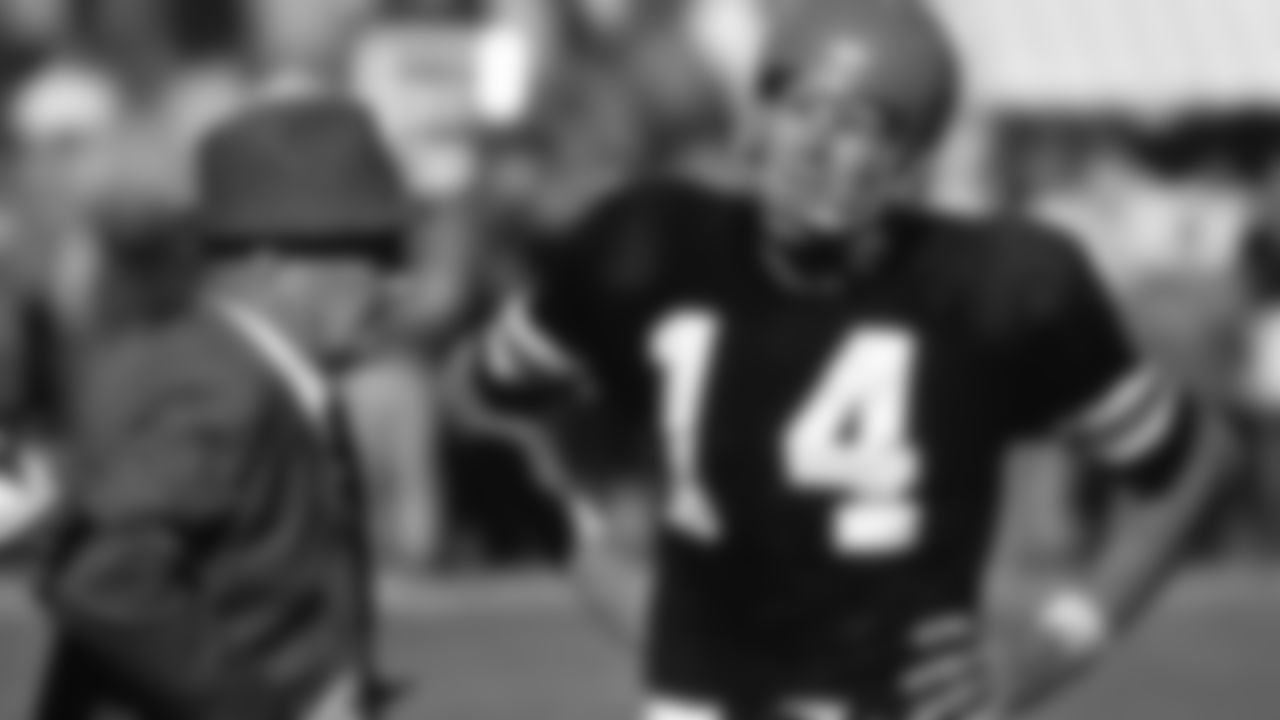Bengals Super Bowl head coach Sam Wyche, whose pioneering Xs and Os live in the modern NFL playbook and fiery words breathe on the Paul Brown Stadium walls, died Thursday. He would have turned 75 Sunday.
Wyche died after a brief battle with recurring melanoma in his adopted hometown of Pickens, S.C., where he often served as a volunteer coach for the high school team and a fundraiser for the community's hungry.
His life and times are woven into the orange and black tapestry. An undrafted free agent out of Furman, Wyche became a valued and resourceful back-up quarterback for Paul Brown's original Bengals of 1968. In Riverfront Stadium's first game in 1970, he came off the bench to score the building's first touchdown to lead a stunning upset of John Madden's Raiders. In that season's Riverfront finale he negotiated a 45-7 win over the Boston Patriots that gave them the AFC Central title. Then 18 years later he was carried off the Riverfront turf as the Bengals head coach celebrating the AFC title and a Super Bowl trip.
"Sam was a wonderful guy. We got to know him as both a player and a coach," said Bengals president Mike Brown in a statement. "As our coach, he had great success and took us to the Super Bowl. He was friends with everyone here, both during his tenure as head coach and afterwards. We not only liked him, we admired him as a man. He had a great generosity of spirit and lived his life trying to help others. We express our condolences to Jane and his children Zak and Kerry."
His no huddle offense, once outlawed for about two hours before that victorious 1988 AFC title game against the Bills, is now required for the 21st century game. That season the rest of the NFL couldn't catch up with Wyche's wave of versatile players and plays that caught flat-footed defenses unable to match up. Quarterback Boomer Esiason orchestrated the league's top-ranked offense, a relentless attack that gave him the league MVP and produced a rookie of the year in running back Ickey Woods with 1,066 yards and a 1,273-yard Pro Bowl wide receiver in Eddie Brown as the Bengals went 12-4 and came within 34 seconds of winning Super Bowl XXIII.
"They couldn't match up with us," said former Bengals safety Solomon Wilcots during the 25th anniversary of that season. "When we'd go empty in the backfield, who could cover (running back) James Brooks and (tight end) Rodney Holman? Teams didn't want to see that. We'd go right down the field and score. Sam was a genius."

Wyche's passion stretched far beyond the football field. If he wasn't doodling plays, he was auctioning the napkin for charity. During his eight seasons as the Bengals head coach from 1984-91 he became a tireless advocate for the homeless. When he received a heart transplant in September of 2016, he became the face of organ donation in the Carolinas. Even as recently as late September he had a message for readers of Bengals.com
"Fans. Coaches. Players," said Wyche, who had just discovered a melanoma that was removed from his left temple. "Wear sun tan lotion."
Wyche's tongue was as quick as his wit and offense and he never backed away from controversy. While leading the Bengals to the 1990 AFC Central title he received the largest fine in NFL history at the time when he banned women media from the locker room in the name of his players' privacy and comfort. But when he went on a crusade that turned national, he probably got much of that $27,000 back, if not more, from fans that agreed with him, and no doubt that made its way charity.
The year before that, in a Dec. 10, 1989 game at Riverfront Stadium against Seattle, Wyche, already irked at the officials, became even more miffed when fans showed their displeasure by throwing snowballs on the field. Wyche jogged across the field to public address announcer Tom Kinder, grabbed his microphone and after telling fans to turn in anyone in they saw pelting snow, he reminded them, "You don't live in Cleveland, you live in Cincinnati."
Those words are now written on one of PBS's outside walls and, of course, Wyche used it for a good cause. The next spring he traveled to Cleveland and teamed with Browns quarterback Bernie Kosar to raise money for The Salvation Army. For $5 a baseball throw, fans could try and dunk Wyche into the chilly waters of March. Kosar did it with a football on their way to raising $11,000.
As a player, Wyche and his busy notebooks caught the attention of Paul Brown. But as Brown's head coach, Wyche didn't hesitate to go off script. After the 1987 players' strike ripped apart his 4-11 team, Wyche decided to room black players with white players and offensive players with defensive players in the next training camp. The rooming assignments at Wilmington College in Wilmington, Ohio have been seen by the MVP and captain as a big reason the Bengals had a Super Bowl season.

"A great idea," said Esiason during the 30th anniversary of that camp. "I think it helped, but when you're part of a winning team, that helps more than anything. The foundation of whatever we built in '88 was probably laid that July and part of that foundation was the whole rooming situation that Sam put together."
When he reminisced about that camp in the summer of 2018, Wyche said he was trying to heal the wounds of '87.
"My objective was to make the team more familiar with each other," Wyche said. "There was a lot of division in the locker room (because of the strike), a lot of close games we could have won but didn't for every reason imaginable.
"I wanted them to be able to look at each other in the fourth quarter in December with the playoffs on the line and know their teammates' wives names and know what was important in their lives, what they wanted to do after football. Truly a team, a family that would work for each other because they knew each other that well. I was wondering how many guys left after bed check, but nobody seemed to."
Wyche's tenure in Cincinnati, with an overall record of 64-68, matched Paul Brown's term and included the winningest post-season record of any Bengals head coach at 3-2. His run came to an abrupt halt after an infamous Christmas Eve morning meeting with Mike Brown following a 3-13 season in 1991. Brown claimed Wyche resigned. Wyche said he was fired with two years left on his deal. Days later Wyche was hired in Tampa Bay as the Buccaneers head coach and weeks later settled with Brown, a rift that never altered the antiquing friendship of the wives, Nancy Brown and Jane Wyche, or the relationship of Wyche and Brown that began in that first training camp in Wilmington.
After Wyche was let go in Tampa after the 1995 season following a 23-41 run, the Bucs hired Tony Dungy. Wyche's 84 regular-season wins are 55th on the list, one ahead of Gary Kubiak and one behind Jason Garrett. It's also the 39th most wins by head coaches with more than one team.
A look back through the years of former Bengals player and head coach Sam Wyche. Wyche led the Bengals to the franchise's second Super Bowl. He passed away on Thursday, January 2, 2020 at the age of 74.

Cincinnati Bengals coach Sam Wyche watches play during an NFL football game in 1989. (Al Messerschmidt via AP)

Cincinnati Bengals' head football coach Paul Brown, right, talks with two of his quarterbacks during a workout on Aug. 21, 1970, at their training camp in Wilmington, Ohio. At left is Dave Lewis, also a punter, and Sam Wyche, center. (AP Photo/Gene Herrick)

Bengals head coach Sam Wyche coaches the team on the sidelines during Super Bowl XXIII.

Cincinnati Bengals head coach Paul Brown, left, speaks to Bengals quarterback Sam Wyche (14) in this undated photo. (Tony Tomsic via AP)

Cincinnati Bengals head coach Sam Wyche talks to quarterback Boomer Esiason (7) during the NFL Super Bowl XXIII game against the San Francisco 49ers in Miami on January 22, 1989. (AP Photo/Al Messerschmidt)

Cincinnati Bengals head coach Sam Wyche during a game from his 1990 season with the Cincinnati Bengals. (David Durochik via AP)

Cincinnati Bengals coach Sam Wyche directs play during an NFL football game in December 1988. (Al Messerschmidt via AP)

Cincinnati Bengals head coach Sam Wyche talks to his players during an NFL Super Bowl XVII game against the San Francisco 49ers in Miami on January 22, 1989. (AP Photo/Al Messerschmidt)

Head Coach Sam Wyche during a game from his 1988 season with the Cincinnati Bengals. (David Durochik via AP)

Cincinnati Bengals coach Sam Wyche stabs the air as he is carried from the field on the shoulders of his players after their 21-10 victory over the Buffalo Bills for the AFC Championship game in Cincinnati , Ohio, Jan. 9, 1989. (AP Photo/Rob Burns)







